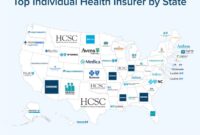Health insurance for self-employed introduces the crucial need for coverage and the challenges faced in obtaining it, while exploring cost-saving strategies and coverage options.
Detailing the various types of plans available and the key factors to consider, this topic aims to provide a comprehensive guide for self-employed individuals seeking health insurance.
Overview of Health Insurance for Self-Employed Individuals
Health insurance is crucial for self-employed individuals as it provides financial protection against unexpected medical expenses. Without health coverage, self-employed individuals may face significant financial strain in the event of illness or injury.
When it comes to achieving your fitness goals, having expert guidance can make all the difference. That’s why personal training for weight loss is a great option. With personalized workouts and nutritional advice, you can reach your ideal weight effectively.
Challenges Faced by Self-Employed Individuals
Self-employed individuals often struggle to obtain affordable health insurance due to limited options and higher premiums compared to group plans offered by employers. They may also face difficulties in navigating the complex healthcare system to find suitable coverage.
For busy individuals, finding time to stay active can be tough. However, by building a fitness routine that fits your schedule, you can prioritize your health. Simple tips like scheduling workouts and meal prepping can make a big difference in maintaining a healthy lifestyle.
Percentage of Uninsured Self-Employed Individuals in the US
According to recent statistics, approximately 15% of self-employed individuals in the United States do not have health insurance coverage. This highlights the significant number of self-employed individuals who are at risk of facing financial hardship in case of medical emergencies.
Staying motivated and fit can be challenging, but with the right tools, like the best fitness apps for tracking workouts , it becomes easier. These apps offer workout plans, progress tracking, and even motivation tips to keep you on track towards your fitness goals.
Options Available for Self-Employed Individuals, Health insurance for self-employed
- Health Insurance Marketplaces: Self-employed individuals can explore options available through the Health Insurance Marketplace established by the Affordable Care Act. This platform offers a range of plans with varying coverage levels and costs.
- Health Savings Accounts (HSAs): HSAs allow self-employed individuals to save money tax-free for medical expenses. These accounts can be used in conjunction with high-deductible health plans.
- Catastrophic Health Insurance: This type of plan provides coverage for serious medical emergencies and has lower premiums compared to traditional health insurance plans. However, it comes with high deductibles.
- Association Health Plans: Self-employed individuals can join professional or trade associations to access group health insurance coverage. These plans may offer more affordable rates and better benefits.
Types of Health Insurance Plans for Self-Employed Individuals

When it comes to health insurance plans for self-employed individuals, there are several options to consider based on different needs and preferences. It’s essential to understand the benefits and drawbacks of each type of plan to make an informed decision that suits your unique situation.
Individual Plans
Individual health insurance plans are purchased directly from insurance companies and are not tied to an employer. These plans offer flexibility in terms of coverage options and provider networks. However, they can be more expensive compared to group plans due to the lack of employer contributions.
Marketplace Plans
Marketplace plans, also known as Affordable Care Act (ACA) plans, are available through the federal or state health insurance exchanges. These plans offer subsidies based on income levels, making them more affordable for self-employed individuals. Marketplace plans provide essential health benefits and cannot deny coverage based on pre-existing conditions.
Short-Term Plans
Short-term health insurance plans provide temporary coverage for individuals in transition, such as those waiting for a new job or waiting for open enrollment. These plans offer limited coverage and may not include essential health benefits mandated by the ACA. While short-term plans can be more affordable, they may not provide comprehensive coverage for long-term health needs.
Self-employed individuals should consider several key factors when choosing a health insurance plan, including their budget, healthcare needs, preferred providers, and any pre-existing conditions. It’s crucial to compare different plans, understand the coverage options, and consider the long-term implications of each plan before making a decision.
Cost Considerations and Affordability: Health Insurance For Self-employed

When it comes to health insurance for self-employed individuals, one of the key factors to consider is the cost. Understanding the expenses associated with health insurance can help self-employed individuals make informed decisions about their coverage options.
Analyzing Costs
- Health insurance premiums: Self-employed individuals are responsible for paying the full cost of their health insurance premiums, unlike those who receive employer-sponsored coverage. Premiums can vary depending on the plan chosen, age, location, and other factors.
- Out-of-pocket costs: In addition to monthly premiums, self-employed individuals may have to pay out-of-pocket costs such as deductibles, copayments, and coinsurance for covered services.
Saving Money on Premiums
- Shop around: Compare different health insurance plans to find one that offers the best value for your specific needs. Consider factors like coverage, premiums, deductibles, and network providers.
- High-deductible plans: Opting for a high-deductible health plan (HDHP) can lower monthly premiums, but it’s important to have a health savings account (HSA) to cover out-of-pocket costs.
- Healthy lifestyle: Maintaining a healthy lifestyle can help reduce the need for medical services, ultimately lowering healthcare costs and insurance premiums.
Financial Assistance Programs
- Marketplace subsidies: Self-employed individuals may qualify for premium tax credits through the Health Insurance Marketplace, which can help lower the cost of coverage.
- Medicaid: Depending on income level and family size, self-employed individuals may be eligible for Medicaid, a state and federally funded program that provides free or low-cost health coverage.
- COBRA: The Consolidated Omnibus Budget Reconciliation Act (COBRA) allows self-employed individuals to continue their employer-sponsored health insurance for a limited time after leaving a job, though at a higher cost.
Coverage Options and Limitations

When it comes to health insurance plans for self-employed individuals, understanding the coverage options and limitations is crucial for making informed decisions to protect your health and finances.
Coverage Options
- Basic Medical Services: Most health insurance plans for self-employed individuals cover essential medical services such as doctor visits, hospitalization, emergency care, and preventive care.
- Prescription Drug Coverage: Many plans include coverage for prescription medications, helping to offset the cost of necessary drugs.
- Mental Health Services: Some plans provide coverage for mental health and behavioral health services, including therapy and counseling.
- Maternity Care: Coverage for prenatal care, labor and delivery, and postpartum care may be included in certain health insurance plans.
- Alternative Treatments: Depending on the plan, coverage for alternative therapies like acupuncture or chiropractic care may be available.
Limitations and Exclusions
- Pre-Existing Conditions: Some health insurance plans may exclude coverage for pre-existing conditions for a certain period after enrollment.
- Out-of-Network Providers: Coverage may be limited or non-existent for services received from healthcare providers outside of the plan’s network.
- Specific Treatments or Services: Certain treatments or services may not be covered by a health insurance plan, requiring self-employed individuals to pay out-of-pocket.
- Annual or Lifetime Limits: Some plans impose limits on the amount of coverage available each year or over a lifetime, potentially leaving individuals responsible for excess costs.
Maximizing Coverage and Minimizing Expenses
- Choose an Adequate Plan: Select a health insurance plan that aligns with your healthcare needs and budget to ensure sufficient coverage.
- Utilize Preventive Services: Take advantage of preventive care services covered by your plan to maintain good health and potentially avoid costly medical issues in the future.
- Stay In-Network: Opt for healthcare providers within your plan’s network to maximize coverage and reduce out-of-pocket costs.
- Review and Understand Your Policy: Familiarize yourself with the details of your health insurance policy, including coverage limitations and exclusions, to avoid unexpected expenses.
In conclusion, navigating the realm of health insurance as a self-employed individual requires careful consideration and understanding of available options to ensure adequate coverage and financial stability.



